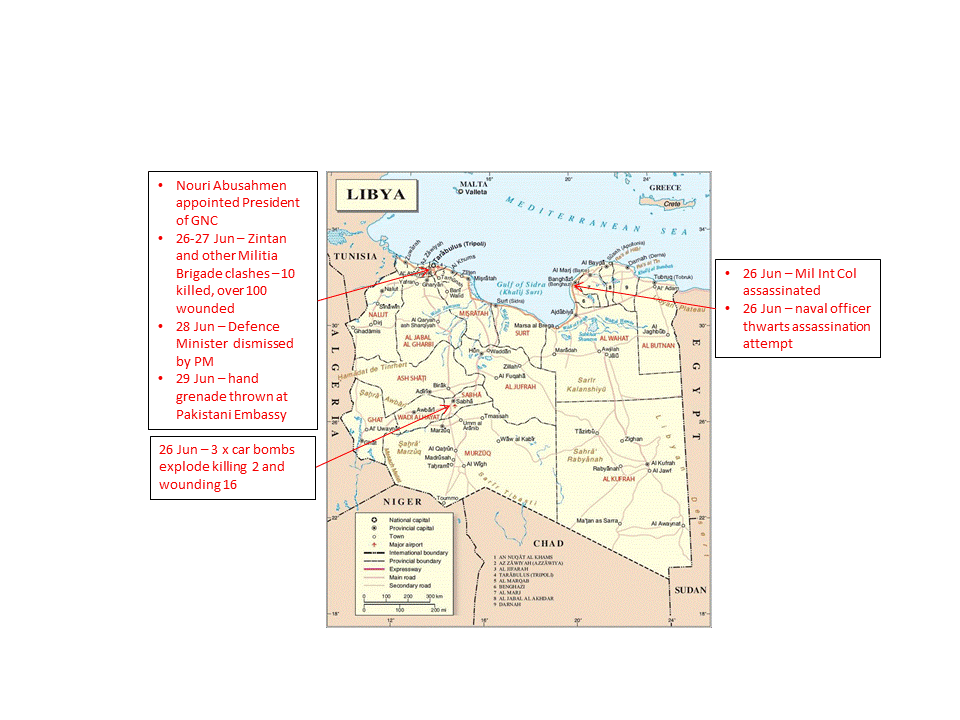Overview
This last week saw the new President of the General National Congress appointed. Nouri Abusahmen is a berber and from the western coastal town of Zuwara. Although an independent member of the GNC he is supported by the Muslim Brotherhood bloc of support within the GNC where he won just over half of the members’ votes. His first major task will be the drafting of the constitution.
Tensions spilled over this week in Tripoli with two militia brigades clashing for two days in the city along the airport road with at least 10 reported killed and others wounded. The fallout from the clashes was the removal by the Prime Minister of the Defence Minister, Mohammed Barghathi. He becomes the latest political casualty of the Prime Minister’s frustration at the lack of order and security in the country. The acting Army Chief of Staff also received a broadside from Ali Zeidan in response to comments made that the Army was unable to intervene in the militia clashes because of lack of resources.
Violence was not confined to Tripoli but has occurred in the south in Sabha where two were killed and others wounded when three separate car bombs exploded. The trend of targeted assassinations in Benghazi against members of the Armed Forces has continued with the failed attempt on a naval officer and the killing of a military intelligence colonel.
New protests have once again shut down several oil facilities resulting in a cut in output by a third. The protests are at a number of fields owned by the Zueitina Oil Company: 103D, 103A and Zala. The protests are over working conditions and demands for changes in management. The Sahara field also remains shut and this was the root cause of the Zintan Brigade’s clashes with another Brigade in Tripoli over the replacement of security providers on the field.
Finally, the announced return of Tawerghans has been thwarted by the local authorities in Ajdabiya, who turned back a number of convoys bound for Tawergha. Pressure and tension around this issue can only build unless a clear resolution can be found.
Tripolitania (Western Libya)
The clashes between the Zintan Brigade and another militia brigade began on 26th June following an attack by members of the Zintan Brigade on the Tripoli headquarters of the Petroleum Facilities Guard in the Salahaddin district that led to the other Brigade intervening with five being killed and members of the Zintan group being detained. The Zintan group had been employed in security duties in the south on the Sahara field but had been replaced by another group and were demanding their jobs back. The next day, 26th June, the Zintan Brigade then attacked the headquarters of the other brigade that had intervened the previous day and sustained clashes occurred along the airport road in the Abu Slim district of the city. The Zintanis who had been detained the previous day were released when the headquarters was over-run. A further five were killed in this fighting with a further 100 being wounded. The fighting has now abated but there are continuing concerns at the potential for other such outbreaks to occur and the capacity of the regular security forces to react.
These concerns have been given credence by the acting Chief of Staff, Gen Salem al-Gnaidy that his forces would have intervened but lacked the means. This has been quashed by the Prime Minister, who has taken the General to task for his statements assuring the people that the means are available. The chaos in the capital then led to the dismissal of the Defence Minister by the Prime Minister for his failure to deal with the specific issue and the more general one of armed groups. The Defence Minister resigned a couple of weeks ago in response to the Libya Shield Brigade killings in Benghazi but was reinstated with General Mangoush, the then Army Chief of Staff being removed instead. The issue of militias – either aligned with the Ministries of Interior and Defence or not – continues to be a running sore in the stability of Libya. The violence is impacting upon oil exports, the confidence of the international community and business to invest and the governmental institutions of Libya to deal with its many other issues, not least a new constitution.
The threat to diplomatic interests also continues with the latest manifestation being a hand grenade thrown at the Pakistani Embassy in the early hours of Saturday. It exploded outside the main entrance causing minor damage to it but with no casualties.
Cyrenaica (Eastern Libya)
Two assassinations of members of the security forces took place this week with one being successful and one being thwarted. On 26th June a colonel in military intelligence was killed when his exploded in the Al-Majouri district of Benghazi. Despite being taken to the city’s hospital he later died of his wounds. That same day a naval officer shot dead one of three would-be assassins also in Benghazi.
Fezzan (South-western Libya)
Sabha continues to be a focus for unrest and violence and this week was no different with three car bombs exploding on 26th June. The blasts all occurred in the evening and outside popular venues where people would be known to gather such as the Khalil Café in Agaid, the Fezzan Hotel and a shopping district in Qurtba. The motives for the attack are not yet known. Two people were killed and a further 16 were wounded in the blasts.





